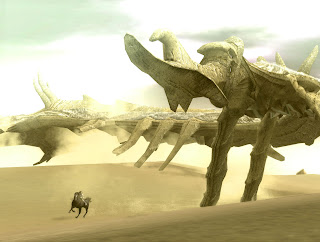This is part of an ongoing series about my favorite memories
from video games. You can find the original list and table of contents in last month's post or by clicking here. Please be aware that these posts are going to be full
of spoilers which may ruin the impact of these events on anyone who wishes
to experience them on their own in the future. I’m sorry that my schedule got
out of sync. I plan to be back on track for weeks to come, now.
#6 - The First Colossus, Valus the Minotaur
I played and enjoyed Ico years earlier, the predecessor developed by Team Ico, so I was interested in Shadow of the Colossus initially. A friend somehow convinced me to pick it up shortly after its original release back in 2005. Other than a friend’s trusted recommendation that I would enjoy it, I didn’t have any real expectation for the game. I assumed I would find it fascinating and artistic as I had previously found Ico. That was perhaps my initial reaction, but that would all change as I found myself up against the first colossus, Valus the Minotaur.
Much like Ico, the
game doesn’t waste time on words. You experience the story through actions and
environments mostly. As the game opens with Wander arriving at some ancient
temple with his horse Agro carrying the unconscious woman named Mono, this is
practically all you will know for sure about them for most of the game. Wander
proceeds to contact some powerful being named Dormin and requests he return
Mono’s soul back to her body. Dormin replies with a deal. Wander defeats the
sixteen colossi spread across the land and he’ll comply if it’s possible. After that, the game starts and the world is yours to explore. This story seems very
basic and simple, but it's already sowing the seeds of doubt about the dubious nature of this deal.Wander is willing
to risk so much simply for the possibility that Mono may be returned, and he
pays no heed to what it may cost. The notion is romantic, but also hauntingly desperate.
This game has your mind already turning over the possibilities with just a few lines of simple dialogue.
 |
| Are you intimidated yet? Do you feel desperate and alone? |
The light from Wander’s sword leads to a cliff where a
brief tutorial teaches how to climb, jump, duck and roll – all the physical
skills a budding colossus slayer needs to survive. When Wander finally crests
the top of the cliff, there’s a brief cutscene to introduce the player to the
first colossus. Each colossus is usually introduced with a rather cinematic
scene which clearly illustrates just how gigantic they are compared to Wander.
As Valus lumbers past he doesn't notice Wander standing there, as if he
were an insignificant insect. Wander appears barely taller
than the hoof of this cloven-foot monstrosity. If wandering through the lonely
landscape didn’t make you feel alone, desperate and perhaps insignificant then
standing at the toes of a giant surely will drive the feeling home. Valus
continues on his way, away from Wander.The letter-box frame of the cutscene
fades away leaving you to chase after this enormous creature and begin to look
for a way to defeat it.
 |
| He is not so big and tough from this camera perspective! |
There are countless games of lone
warriors braving all odds against formidable foes or impenetrable fortresses,
but they all emphasize action or drama. Shadow
of the Colossus really emphasizes emotion. From the art design to the music
selection, from the cinematic scenes to the minimal dialogue and character interaction,
everything lends to influence the way a player will feel when playing the game.
Aside from the loneliness and the despair, there is also a great sense of
foreboding, sadness and tragedy. As I played the game, I feel a certain amount
of delight in conquering these living mountains, but when I finally plunge
Wander’s sword in for the final time, as the behemoth takes its final steps
before falling lifeless, I’m not met with a victorious fanfare to celebrate my
achievement, but a sorrowful dirge to mourn its passing. I questioned early on
whether what Wander was doing was even right. The game makes each victory feel
monumentally triumphant, but also tremendously sad. It’s woven together
beautifully and because you are Wander, because this story is told as a video
game, you truly get to experience it all yourself as if it were you.
I cannot stress enough that this is a game to experience
rather than read about, and there has never been a better time. Both Ico and Shadow of the Colossus were re-released in HD for the Playstation 3
back in September, 2011. Since then I’ve played through Colossus two more times. Everything is even more breathtaking in
high definition. But even if you only have access to a Playstation 2, it’s
still worth tracking down a copy of this game and experiencing it for yourself
first-hand. This is the one entry in my TOP Ten that I doubt I could spoil
because each person will probably take something away from this game that is
unique to their own personal experience. Whether you lost someone you cared
about, or have felt alone, insignificant, or desperate in some other fashion,
the game really speaks to human emotions. As long as you’re not expecting an
action packed adventure game, I believe it’s a game that anyone (with emotions)
can appreciate.
-TOP
@TOPGamingBlog
Related Links
TOP Ten Memorable Moments
Shadow of the Colossus soundtrack on Grooveshark
Valus the Minotaur on YouTube - http://www.youtube.com/watch?v=Cbqt_XlXRl4
-TOP
@TOPGamingBlog
Related Links
TOP Ten Memorable Moments
Shadow of the Colossus soundtrack on Grooveshark
Valus the Minotaur on YouTube - http://www.youtube.com/watch?v=Cbqt_XlXRl4




The last song in the widget gives me goosebumps.
ReplyDelete